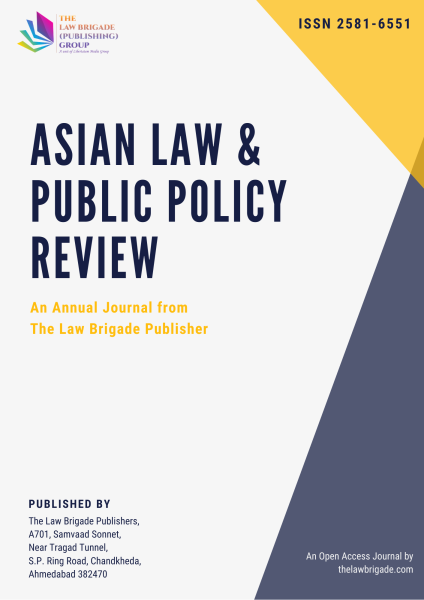- Double Blind Peer Reviewed
Asian Law & Public Policy Review
Asian Law & Public Policy Review is an Annual e-Journal of Law & Public Policy Analysis bearing ISSN: 2581-6551. The Journal covers contemporary issues of Law & Public Policy and is not limited to any specific topic or subject.

Cited By





Indexing Details
Archive of Asian Law & Public Policy Review
Latest Publications
EY Ltd. v. Addl Commissioner, CGST: Preventing the Mischaracterization of Service Exports as Intermediary Services
The Indian Foreign Trade Policy (FTP), 2023- affixed 4 panoptic directives: being ‘(i.) Incentivized Remission; (ii.) Cohesive Export Promotion (ii.) Mitigated Transaction Costs- fostering Enterprise Viability (iv.) Emerging Sector Exports and Export Control (i.e., SCOMET) Rationalization’[1]. The ‘expanded ambit’ of export transactions, devoid of obstructive-regulatory costs- subject to maximized prospective remission, is hence the idealized
Non-Recourse Lending to Cross-Border Infrastructure Undertakings: Indian Credit’s Lost Opportunity?
One of the main distinctions of debt finance for infrastructure ventures (i.e., syndicate lending by banking institutions for specific project development) from generic corporate undertakings (i.e., debenture issues financing expansionary productive factor acquisition) is the scope for obtaining such leverage on Non-Recourse/Limited-Recourse terms, exclusively characteristic of infrastructure ventures.[i] The term Recourse in this context, implies
Research on the Value Pursuit of RCEP’s “Green Development” Clause
This paper starts with the theoretical source clause of RCEP’s “green development”, examines the preface and main text of RCEP, and analyzes its relationship with “intra generational fairness” from the “development orientation” and “green orientation” of RCEP’s “green development” clause. The analysis shows that the deficiencies in the value aspect have a significant impact on
Analyzing the Regulatory Arbitrage Potency of the Indian Corporate Restructuring Regime, in the Specific Context of Reverse Mergers from the Lens of Investor Protection
The concept of corporate restructuring may be primarily defined as the systemic alteration of corporate composition; entailing the “re-organization” of business activity [classified as principal revenue generation/operation; Investment (Portfolio-Holding) and Financing][i] in furtherance of the optimal fulfilment of organizational objectives (subject to the mitigation of extraneous and intrinsic cost- inclusive of ‘Agency Costs’). Corporate restructuring,
The Inherent Futility of ‘Exceptional’ Debt Recovery Mechanisms Alternative to the SARFAESI, 2002: Such as the ‘OTS’ Scheme Due to Creditor Rights Primacy
The primary modus of debt recovery by ‘Secured-Creditors’, in the jurisdiction of India, is subject to the legislative impetus of the Securitization and Reconstruction of Financial Assets and Enforcement of Security Interest Act, 2002 (SARFAESI Act, 2002), with the alternative/resultant: initially direct (for secured-creditors) /appellate (for borrowers), recourse of Debt Recovery Tribunals and Debt Recovery
Exploring Human Dignity in Africa through the Lens of a Muslim
This study explores the relationship between Islam and human dignity in Africa, focusing on Islamic teachings on social justice, human rights, and ethical issues. It examines how Islam has influenced African conceptions and practices of human dignity, highlighting the obstacles to dignity and the effective ways Islamic values have been applied. The study provides theoretical
